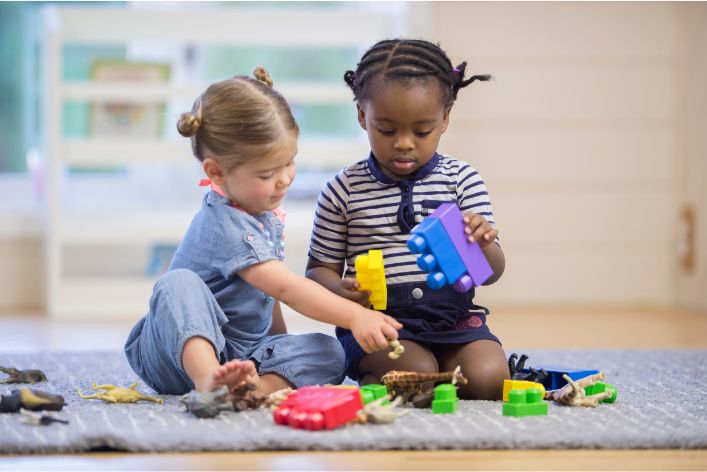Introduction
In child development, hitting key milestones is essential. These developmental milestones are markers representing crucial skills and capabilities that a child should master by a specific age. They provide a measure of whether a child is developing appropriately for their age or not, which can raise any potential issues.
As a parent, understanding these milestones is critical. You can know if your child is on track and ways to help them develop.
Our blog will guide Nigerian parents on critical developmental milestones to identify and support their child’s growth and development. Emphasis will be on the milestones for 0-6, 6-12, and 12-24 months.
We will delve into identifying physical milestones like rolling over, sitting up, crawling, standing, walking, running, among others, and how to recognize social and emotional, cognitive and language development milestones.
With this handy guide, you’ll know what to expect as your child grows and how to stimulate their growth to ensure they meet their potential. We aim to empower parents with knowledge to identify and support their children’s growth, positively impact their lives and ultimately help shape Nigeria’s future.
Physical Milestones
- Motor skills (sitting, crawling, walking) are significant physical milestones for infants as they gain more control over their bodies.
- Hand-eye coordination is a crucial factor in a child’s development as it allows them to use their hands and eyes together, improving their dexterity and fine motor skills.
- Fine motor skills, such as holding a pencil or buttoning a shirt, develop over time and improve a child’s ability to perform simple tasks.
However, achieving these physical milestones takes time, and parents should allow their children to develop at their own pace. One critical step in a child’s physical development is tummy time.
When a baby is placed on their stomach, they build strength in their neck, arms, and torso, preparing them for crawling and other physical movements.
According to pediatricians, infants should have at least 30 minutes of supervised tummy time a day. Experts recommend starting tummy time from the first few weeks of an infant’s life and increasing the amount gradually.
Recommendations for Physical Activities
Once a child gains more control over their body, parents can encourage physical activities such as crawling, walking, and playtime in the park.
Below are some recommendations for physical activities that parents can do with their children:
- Walking practice: hold both hands while walking back and forth
- Playing with balls: playing with different sizes and textures of balls helps develop hand-eye coordination.
- Swimming: improves coordination, balance, and body awareness.
- Crawling: crawling helps develop gross motor skills and strengthens the muscles of the arms, legs, and core.
- Biking: Starting from a balance bike at two years old helps develop spatial awareness and balance.
It’s essential to keep in mind that while physical activities are essential, safety should always be a priority. Make sure to let children engage in activities only under supervision.
Parents should also note that children develop differently and reach milestones at different rates. While some infants may start walking earlier, others may take time to develop their motor skills. Therefore, it’s crucial to provide ample opportunities for kids to engage in physical activities at their pace.
In general, physical developmental milestones are significant for children as they learn to control their bodies better, develop hand-eye coordination, and improve fine motor skills.
Parents should encourage these milestones through tummy time and age-appropriate physical activities while also keeping safety in mind.
Read: Introducing Solids: A Starter Guide for New Parents
Cognitive Milestones
Cognitive milestones refer to the developmental accomplishments that occur during a child’s early years, shaping their understanding of the world around them. As a Nigerian parent, it is important to be familiar with these cognitive milestones in order to track your child’s development.
Parenting Made Just for You
Get personalized Parenting Solutions tailored to your child’s needs. Transform your parenting journey with expert guidance in 1-3 days.
Get StartedHere are five cognitive milestones that are essential for your child’s growth:
Language Development
The development of language skills is one of the most important cognitive milestones in a child’s life. Initially, babies coo and babble before eventually forming words.
At around 2 years, most children start speaking in short sentences. Reading with your child, speaking to them using proper grammar, and encouraging conversation can all promote language development.
Memory and Learning
A child’s ability to learn and store information is crucial to their cognitive development. Memory and learning skills begin to develop during infancy.
As your child grows, you can help improve their memory by engaging in activities such as reading and reciting nursery rhymes. Encourage your child to learn in a fun and engaging way.
Object Permanence
Object permanence refers to a child’s understanding that objects still exist even if they cannot be seen. Children begin to develop this concept during infancy and it is fully understood by around 2 years of age.
Play hide-and-seek with your child or have them search for an object that is hidden behind another object or blanket to help develop their understanding of object permanence.
Problem-Solving Skills
Problem-solving skills refer to a child’s ability to overcome obstacles and come up with solutions. It is an important cognitive milestone that can be developed with the use of puzzles, blocks, and other toys that require the child to think critically and come up with a solution. Encourage your child to figure things out on their own and offer guidance when necessary.
Playtime Activities to Promote Cognitive Development
Playtime is crucial for a child’s cognitive development and allows them to explore new environments and learn new skills. Engage your child in playtime activities that promote cognitive development such as building blocks, playing with puzzles, and reading books.
Take your child to new places and encourage them to explore and learn about their surroundings. By using playtime to promote cognitive development, you can help your child grow and develop to their full potential.
All in all, cognitive milestones are essential to a child’s growth and development. As a Nigerian parent, it is important to be aware of these developmental accomplishments in order to provide the necessary support and encouragement for your child’s cognitive development.
Encourage your child to engage in playtime activities that promote cognitive growth, and seek professional help if you have any concerns about your child’s development. By doing so, you can help set your child on a path towards a successful future.
Read: Consequences of Nutrient Deficiencies in Children

Social and Emotional Milestones
As parents, we often focus on the physical milestones that our children reach, such as rolling over, crawling, and walking. However, it is just as important to pay attention to their social and emotional milestones.
These milestones involve their ability to form relationships, regulate their emotions, and develop a sense of self.Here are some key social and emotional milestones to look out for:
Unveil the Perfect Name that Tells Your Family's Story
Let us help you find a name that embodies your family's values, traditions, and dreams. Our personalized consultation weaves cultural insights to create a name that's uniquely yours.
Get StartedAttachment and Bonding
- Infants develop a bond with their primary caregiver through consistent and responsive care.
- Toddlers begin to explore more, but still rely on their caregiver for comfort and security.
- Preschoolers may begin to form friendships outside of the family unit.
Empathy and Emotional Regulation
- Toddlers start to notice the emotions of others, but may struggle with sharing and taking turns.
- Preschoolers begin to understand that others have feelings and can empathize with them.
- By age 5, children can regulate their emotions and express their feelings in healthy ways.
Self-awareness and Self-esteem
- Toddlers become aware of their own preferences and abilities.
- Preschoolers start to compare themselves to others, which can affect their self-esteem.
- By age 5, children have a stable sense of self and feel good about themselves.
Playtime Activities for Social and Emotional Growth
- Playdates can help preschoolers practice social skills and develop friendships.
- Pretend play allows children to explore emotions and practice empathy.
- Board games and group activities teach children to take turns, cooperate, and problem solve.
Importance of Nurturing Relationships
- Children with secure attachments are more likely to have positive relationships later in life.
- Parents who model healthy communication and emotional regulation help their children learn these skills.
- Encouraging children to express themselves and validate their emotions can build a strong sense of self.
By paying attention to our children’s social and emotional development, we can help them build skills that will serve them well throughout their lives. By nurturing positive relationships and providing opportunities for play and exploration, we can help them grow into healthy and happy adults.
Read: Dealing with Lactose Intolerance in Nigerian Children
Warning Signs
- Delayed speech and language development
- Lack of eye contact or social interaction
- Poor coordination or balance
- Inability to perform age-appropriate tasks
- Extreme irritability or aggression
- Regression in previously acquired skills
As a parent, it is important to be aware of these warning signs and seek professional help if your child is not meeting developmental milestones. Early intervention can make a significant difference in your child’s development and overall quality of life.
Importance of Early Intervention
Early intervention refers to the process of identifying and addressing developmental delays in young children. Intervening as early as possible can help prevent further developmental delays and improve a child’s ability to learn and interact with the world around them.
Research shows that early intervention is particularly effective in addressing speech and language delays, which can have a significant impact on a child’s ability to communicate and socialize with others.
Early intervention can also help improve coordination and motor skills, which are important for daily activities such as dressing, eating, and playing.
Resources for Assessment and Intervention in Nigeria
If you are concerned about your child’s developmental milestones, there are several resources available in Nigeria to assess and intervene as needed.
- Developmental Pediatrics Clinics: These clinics specialize in assessing and treating developmental delays in children.
- Schools for Children with Special Needs: These schools provide specialized education and support for children with a variety of developmental delays.
- Occupational Therapy Centers: Occupational therapists can help children improve their coordination and motor skills through a variety of activities and exercises.
- Speech Therapy Centers: Speech therapists can work with children to improve their communication skills through speech and language therapy.
- Neurodevelopmental Clinics: These clinics specialize in assessing and treating a range of developmental delays, including autism spectrum disorder.
It is important to remember that every child develops at their own pace, and not meeting every developmental milestone exactly on time does not necessarily mean that there is a problem.
However, if you have concerns about your child’s development, it is always better to seek professional advice sooner rather than later. Early intervention can make a significant difference in your child’s life and future success.
Read: Nutrition Transition: Navigating Modern Diet Challenges
Conclusion
As a Nigerian parent, it is important to monitor your child’s developmental milestones. Remember, every child develops at their own pace, but there are key milestones that should be achieved. These include motor skills, language development, cognitive skills, and social and emotional development.
By regularly observing your child’s behavior and consulting with a doctor or developmental specialist if you have any concerns, you can ensure that your child is reaching these milestones.
Additionally, seeking support when there are concerns about developmental delays is crucial. Early intervention can improve outcomes for children with delays or disabilities.
As a parent, it can be difficult to acknowledge that your child may need additional support, but seeking help is the best way to ensure that your child reaches their full potential.
In a nutshell, as a Nigerian parent, your role in monitoring your child’s developmental milestones is vital. Stay proactive, seek support when needed, and celebrate your child’s achievements.



